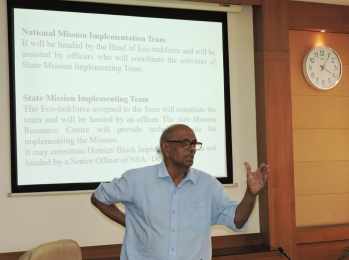Prof C.R. Babu, noted environmentalist and Professor Emeritus, Delhi University, who is credited with a number of success stories and three awards in the field of environmental conservation, was invited on to share with the VIF’s faculty his views on the importance of Ecological Restoration of Degraded Lands and Wastelands. Welcoming the speaker, Dr. Arvind Gupta, Director VIF, recounted many of Prof Babu’s notable achievements - Yamuna, Aravalli and Neela Hauz Biodiversity Parks, among many other ‘barren to beautiful’ stories - wherein large swaths of degraded and wastelands around the national capital have been turned into major tourist attractions, also attracting a wide variety of flora and fauna.
Citing land degradation as one of major challenges of 21st Century, Prof Babu stated during his interaction that it was adversely impacting ecosystems at all spatial scales leading to loss and reduction in ecological services and goods needed for sustainable development. In India about 20 percent of the total geographical area (TGA), i.e. 65 million hectares, are classified as per NRSA (National Remote Sensing Agency) Report,1999-2000, as wasteland. The degraded land in India exceeds more than 56 percent of TGA. What is more, land degradation is a growing trend, with several factors - wind erosion, water erosion, vegetation degradation, among other causes - contributing to it. Painting a grim picture of the severe consequences of increasing degraded and wastelands, the noted ecologist warned that humanity is staring in the face of possibly sixth mass extinction, with the extinction rates assumed to be 100 times higher than the background extinction rate. The question therefore is what do we do about it?

The answer is ecological restoration of degraded landscapes or dead ecosystems to their original natural states. Ecosystem is an area where all the four environmental or natural resources interact and form a complex, dynamic and self-sustaining natural system. It is in these natural systems that the interactions among environmental resources generate key ecological processes leading to the generation of ecological services and goods.
Prof Babu, as part of his talk, shared some of his experiences in restoring wastelands across various regions of India. Most importantly, while re-emphasising that magnitude of land degradation across the country was high, he floated the idea that a National Mission on Ecological Restoration of Degraded Lands and Wastelands is a necessity to ensure environmental sustainability that in turn ensures sustainable development. He further defined that the goal of the National Mission would be to reduce the area under wastelands and degraded landscapes every year by 5000 hectares; to increase the area under natural forest ecosystems by 0.025 million hectares every five years; reduce biodiversity losses and enrichment of biodiversity; and to enhance productivity of marginal lands. The Professor went into nuts and bolts of what such a National Mission would comprise of.
A lively interactive session followed the presentation.









Post new comment